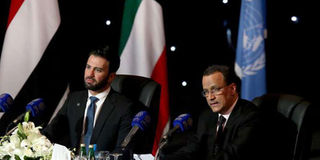Yemen talks aimed at ending 13 months of war resume in Kuwait

United Nations Special Envoy to Yemen Ismail Ould Cheikh Ahmed (right) and UN spokesman Charbel Raji attend a press conference at Kuwait's information ministery in Kuwait City on April 22, 2016. Delayed peace talks aimed at ending 13 months of conflict in Yemen resumed, a day after UN mediators finally managed to get warring sides to the table. AFP PHOTO | YASSER AL-ZAYYAT
What you need to know:
- Delayed peace talks aimed at ending 13 months of conflict in Yemen have resumed, a day after last-gasp UN mediation efforts managed to get warring sides to the same table.
- The United Nations hopes negotiations - which were originally due to begin on Monday - would put a stop to fighting across the country that has killed more than 6,800 people and displaced 2.8 million since March 2015.
- UN special envoy Ismail Ould Cheikh Ahmed appealed to government and rebel delegations to seize the chance, saying Yemen was closer to peace than any time before.
KUWAIT CITY, Friday
Delayed peace talks aimed at ending 13 months of conflict in Yemen have resumed, a day after last-gasp UN mediation efforts managed to get warring sides to the same table.
The United Nations hopes negotiations - which were originally due to begin on Monday - would put a stop to fighting across the country that has killed more than 6,800 people and displaced 2.8 million since March 2015.
UN special envoy Ismail Ould Cheikh Ahmed appealed to government and rebel delegations to seize the chance, saying Yemen was closer to peace than any time before.
The rebel delegation from the Shiite Houthi militia and allied representatives of ex-president Ali Abdullah Saleh arrived in the Gulf state late Thursday after receiving assurances from the UN that a ceasefire - in place since April 11 - would be respected.
THREATENED TO PULL OUT
Delegates representing the government of President Abedrabbo Mansour Hadi had threatened to pull out of the talks if the rebels weren’t around the table by Thursday evening.
The first session ended after less than two hours and the next round began on Friday afternoon.
Kuwait Foreign Minister Sheikh Sabah al-Khaled Al-Sabah opened the Thursday’s meeting by hailing the talks as a historic opportunity to end the bloodshed.
“War will only lead to more devastation, losses and displacement of people,” he said.
Yemen has been riven by fighting since a Saudi-led coalition launched operations last year against Iran-backed Houthi rebels, who earlier seized the capital and expanded their presence across central and southern areas.
The violence has allowed jihadists, including Al-Qaeda and the Islamic State group, to make headway, overrunning parts of south Yemen and establishing a toehold around second city Aden - the government’s temporary base.
Yemen’s war has also sent tensions between Shiite Iran and Sunni Gulf states soaring as, like in Syria, they back opposing sides.
UN-sponsored peace efforts failed to make any headway, and the last ceasefire in December was repeatedly violated and eventually abandoned by the Arab coalition on January 2.
But the UN envoy said the latest truce and negotiations offered a unique chance to end the violence.
“Today, you have one of two options; a secure nation that guarantees an honourable life or the ruins of a nation,” he told delegates.
The rebel delegation met Ould Cheikh Ahmed after the opening session and stressed the need to secure the ceasefire.
The delegation said the key to reaching a solution was agreeing on a transitional authority.





